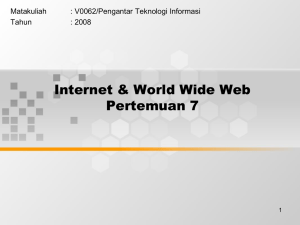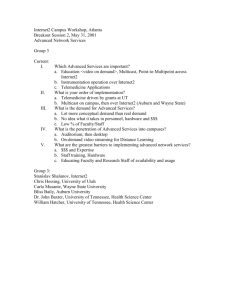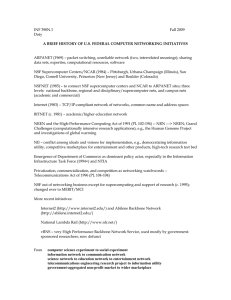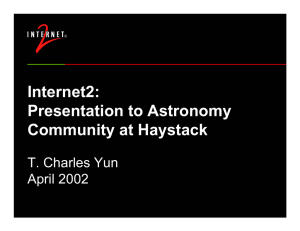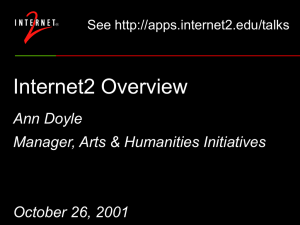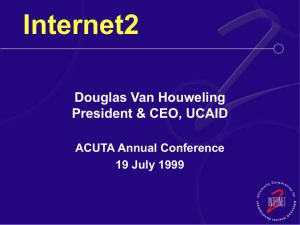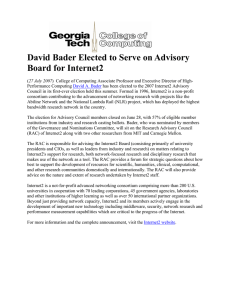ADECT - Sponsored Education Group Participant (SEGP) Proposal
advertisement
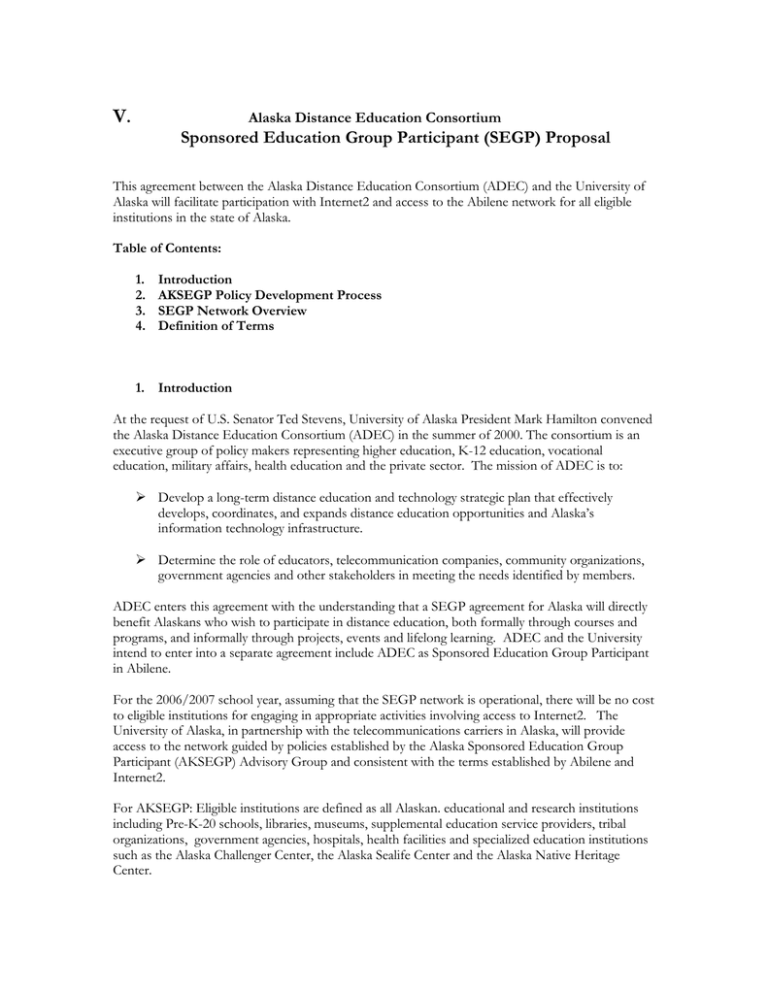
V. Alaska Distance Education Consortium Sponsored Education Group Participant (SEGP) Proposal This agreement between the Alaska Distance Education Consortium (ADEC) and the University of Alaska will facilitate participation with Internet2 and access to the Abilene network for all eligible institutions in the state of Alaska. Table of Contents: 1. 2. 3. 4. Introduction AKSEGP Policy Development Process SEGP Network Overview Definition of Terms 1. Introduction At the request of U.S. Senator Ted Stevens, University of Alaska President Mark Hamilton convened the Alaska Distance Education Consortium (ADEC) in the summer of 2000. The consortium is an executive group of policy makers representing higher education, K-12 education, vocational education, military affairs, health education and the private sector. The mission of ADEC is to: Develop a long-term distance education and technology strategic plan that effectively develops, coordinates, and expands distance education opportunities and Alaska’s information technology infrastructure. Determine the role of educators, telecommunication companies, community organizations, government agencies and other stakeholders in meeting the needs identified by members. ADEC enters this agreement with the understanding that a SEGP agreement for Alaska will directly benefit Alaskans who wish to participate in distance education, both formally through courses and programs, and informally through projects, events and lifelong learning. ADEC and the University intend to enter into a separate agreement include ADEC as Sponsored Education Group Participant in Abilene. For the 2006/2007 school year, assuming that the SEGP network is operational, there will be no cost to eligible institutions for engaging in appropriate activities involving access to Internet2. The University of Alaska, in partnership with the telecommunications carriers in Alaska, will provide access to the network guided by policies established by the Alaska Sponsored Education Group Participant (AKSEGP) Advisory Group and consistent with the terms established by Abilene and Internet2. For AKSEGP: Eligible institutions are defined as all Alaskan. educational and research institutions including Pre-K-20 schools, libraries, museums, supplemental education service providers, tribal organizations, government agencies, hospitals, health facilities and specialized education institutions such as the Alaska Challenger Center, the Alaska Sealife Center and the Alaska Native Heritage Center. 2. AKSEGP Policy Development Process There will be four groups that will meet to develop policy, procedures and the technical infrastructure for AKSEGP. a. AKSEGP Infrastructure Workgroup: This group, consisting of representatives from all of Alaska’s telecommunications providers has been meeting regularly to develop the AKSEGP Network Overview (attached). This group will continue to meet regularly until the network is established. Once AKSEGP is available to all Alaskan sponsored participants (eligible institutions), this group will meet as needed to plan for the maintenance and upgrades of the network. At the next meeting of this group, they will elect a facilitator who will serve for one academic year (September through August). The facilitator will be responsible for meeting arrangements and agendas, communication with members regarding the work of the group and communicating with other constituencies as needed. b. AKSEGP Network Operations Group This group will operate the AKSEGP Network. Engineers and technicians, a sub-group of the AKSEGP Infrastructure Group will install, maintain and upgrade the network as needed in order to provide access to eligible institutions. The operators will work closely with the Infrastructure Work Group to determine the technical specifications and requirements for the network, guided by terms established by Abilene and Internet 2 and policy established by ADEC. c. AKSEGP Advisory Committee: This group will be responsible for writing policy for AKSEGP consistent with the terms established by Abilene and Internet2. Membership will be open to representatives from all eligible institutions, as well as members of the AKSEGP Infrastructure Workgroup. This group will meet in July of 2006 for an initial two day meeting to draft policy regarding: appropriate use, communication with constituents, fee structures, responsibility for network maintenance and upgrades and governance/administration of the AKSEGP. This group will be facilitated by the Director of ADEC. d. ADEC Advisory Committee: The ADEC Advisory Committee consists of representatives from all core and affiliate member organizations (34). The ADEC Advisory Committee will review the policy drafted by the AKSEGP Advisory Committee and recommend either that the policy be returned to the AKSEGP Advisory Committee for revision or clarification, or that the policy be sent to the University of Alaska for review. In August of 2006, the AKSEGP draft policy will be reviewed by the University of Alaska. As the regular member of Internet2, UA is responsible for making certain that the AKSEGP operates according to the terms established by Internet2. After the University’s review, the policy will either be returned to the ADEC Advisory Committee for revision, or sent directly to the ADEC Executive Committee. Following the meeting of the ADEC Executive Committee, AKSEGP policy will be distributed widely and posted on the ADEC website. AKSEGP Infrastructure Workgroup AKSEGP Network Operations Group AKSEGP Advisory Committee ADEC Advisory Committee UA Policy Review ADEC Executive Committee 3. SEGP Network Overview The University of Alaska will submit a Letter of Sponsorship to extend its Participation Agreement with Abilene to the Alaska Sponsored Education Group Participant. AKSEGP will agree to abide by the Abilene Network Terms of Participation and the Abilene Conditions of Use. In accordance with its Letter of Sponsorship, the University of Alaska will have the right to terminate the AKSEGP’s Abilene Participation at any time. The AKSEGP network will be neutral towards participating internet service providers. All Alaskan telecommunications will have an equal opportunity to access the network for appropriate Internet2 traffic. Only appropriate Internet2 traffic will be transported through the AKSEGP network. UA, as the regular member of Internet2 accepts responsibility for making certain that only I2 appropriate traffic is disseminated by AKSEGP. For the first year the following costs will be shared between the University of Alaska and Alaskan Internet Service Providers. -- costs for the development of the AKSEGP network -- costs associated with bandwith to transport the Internet2 traffic -- costs associated with the maintenance and operation of the AKSEGP network The AKSEGP Advisory Group will determine a structure for fees to be charged to support the network and participation in the network after the 2006-2007 school year. The proposal for fees will be approved the ADEC Executive Committee. 4. Definition of Terms: Internet2 and Abilene Terms of Affiliation Abilene Network, Abilene is an advanced backbone network that supports the development and deployment of the new applications being developed within the Internet2 community. Abilene connects regional network aggregation points, called gigaPoPs, to support the work of Internet2 universities as they develop advanced Internet applications. Abilene complements other highperformance research networks. Abilene Connector, Abilene connectors are research and educational institutions connecting directly to the Abilene network. Abilene connectors may be gigaPoPs, universities, affiliate members or other regional networks. Abilene Primary Participant, Primary Participants are Regular, Affiliate and Corporate members who pay membership fees. Primary institutions are typically colleges and universities, but may also be other types of research organizations with the capability of committing and deploying the substantial resources necessary to implement Internet2 capabilities. Before requesting an application to become an Abilene Primary Participant, your organization must be an Internet2 member. Advanced Backbone Network, The high-performance networks participating in Internet2 that provide the environment in which new network applications and capabilities can be deployed and tested. Affiliate Members, Affiliate members are nonprofit organizations that are research- and/or education-oriented. Affiliate members are organizations with a strong interest in the mission and goals of Internet2. Many affiliate members are providing leadership in developing the Internet2 gigaPoPs. . Affiliate members pay Internet2 membership dues and Abilene connection fees (if connected). Affiliate Membership Collaboration Sites, Affiliate members that are nonprofit organizations that are research- and/or education-oriented labs and who meet certain conditions may apply to become collaboration sites. They may connect directly to Abilene or through a gigaPoP. Affiliate members with collaboration site status are responsible for Internet2 membership dues and Abilene connection fees. In addition to the Collaboration Site Application, the Abilene Participation Application is also required. Corporate Member, Internet2 corporate members are committed to promoting the development and deployment of advanced Internet applications and network services. Corporate members are responsible for Internet2 membership dues and Abilene connection fees if they choose to be an Abilene Participant. Corporate Partners, Corporate partners commit $1million+ dollars over the course of three years. Internet2 corporate partners and sponsors have made significant commitments to collaborating with Internet2 universities. Corporate partners are responsible for Internet2 membership dues and Abilene connection fees they choose to be an Abilene Participant. Corporate Sponsors, Corporate sponsors commit $100,000+ dollars over the course of three years. Internet2 corporate partners and sponsors have made significant commitments to collaborating with Internet2 universities. Corporate sponsors are responsible for Internet2 membership dues and Abilene connection fees they choose to be an Abilene Participant. Corporate Collaboration Sites, Corporate members who have research- and/or education-oriented labs and who meet certain conditions may apply to become corporate collaboration sites. It is common for corporate collaboration sites to have existing research orientated relationships with Internet2 Regular Members that require a high performance connection. Corporate collaboration sites may connect directly to Abilene or through a gigaPoP. Corporate members with collaboration site status are responsible for Internet2 membership dues and Abilene connection fees. In addition to the Collaboration Site Application, the Abilene Participation Application is also required. GigaPoP, GigaPoPs are regional network aggregation points formed by Internet2 universities to connect to a variety of high performance, and other types of networks. GigaPoPs provide scalable high-speed connection points. Internet2 gigaPoPs do not pay Internet2 membership dues. A university may be its own gigaPoP, a gigaPoP may be part of a University or its own separate entity. International MoU Partner, through mutual agreements with similar organizations around the world, Internet2 is establishing ties that will help ensure the continued global interoperability of advanced networking, and enable collaboration between U.S. researchers, faculty, students and their overseas counterparts. An international advanced network organization that has signed a Memorandum of Understanding to participate in Internet2 activities may connect to Abilene via a peering network. International partners are not subjected to Internet2 membership dues and are not considered Internet2 members. International University, Universities not located in the United States may not become members of Internet2. Instead, Internet2 has developed relationships with International Partners who are also dedicated to advanced networking. In some cases, the International Partner may operate a high performance network by which an International University may connect. Many International Partner organizations peer with the Abilene network. NGIX (Next Generation Internet eXchange point) Peering Networks, Peering networks are located in the U.S. or internationally that peer with the Abilene network. The peering network is dedicated to high-performance research and education. Examples include the vBNS, NREN, DREN, and ESnet. Regular Member Universities, Member Universities are leading the Internet2 effort to develop new networking capabilities and advanced applications necessary to enhance research and education into the next century. Member universities are responsible for Internet2 membership dues and Abilene connection fees (if connected). Sponsored Educational Group Participants (SEGP), Networked aggregates of educational institutions (including nonprofit and for-profit K – 20, technical, and trade schools) which may also include museums, art galleries, libraries, or hospitals that require routine collaboration on instructional, clinical, and/or research projects, services, and content with Primary participants or with other Sponsored participants. Internet2 will charge the Connector for the Sponsored Educational Group Participant an annual fee of $30,000 per connector per state, plus a variable fee of $2,000 times the current number of Congressional representatives for that state. Sponsored Educational Group Participants may pay fees to the Connector and/or to the sponsoring Internet2 member, where these fees apply to the specific conditions of connection. No fees are assessed directly of the Sponsored Educational Group Participant itself by Internet2. This fee structure will be assessed on an annual basis. Sponsored Educational Group Participants or NOT considered members of Internet2. Sponsored Participants, Sponsored participants are educational institutions (including both notfor-profit and for-profit K-20, technical, and trade schools), museums, art galleries, libraries, hospitals, as well as other non-educational, not-for-profit or for-profit organizations that require collaboration on instructional, clinical and/or research projects with Primary participants or with other sponsored participants. Such organizations are either not eligible or not able to become an Internet2 member. Only Internet2 University members who are primary participants may sponsor a sponsored participant. Sponsored participants are not responsible for membership dues to Internet2 and do not pay any fees to the Abilene Network. Sponsored participants may be responsible for costs associated to the Abilene Connector or to transport (e.g., local loop) providers. These costs are at the discretion of their sponsoring Internet2 Regular Member who is an Abilene primary participant. (Terms provided by Internet2 at http://abilene.internet2.edu/community/terms) This agreement will be effective upon the approval of the sponsorship agreement between the University of Alaska and Internet2. University of Alaska (Regular Internet2 Member) By: Its: Steve Smith Chief Information Officer Date: ALASKA DISTANCE EDUCATION TECHNOLOGY CONSORTIUM (AKSEGP Managing Organization), An Agency of the University of Alaska By: Its: Date: Scott Christian Executive Director
